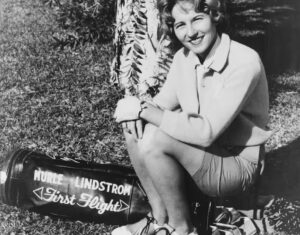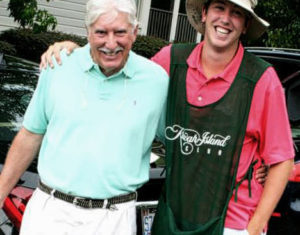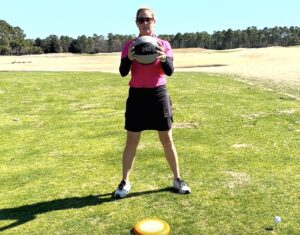The Experts’ Take, Vol. 2, Ep. 4: Project Golf & Its Importance to the Game
How can a Myrtle Beach-based nonprofit organization help grow the game? It already is. Hear how Project Golf is doing so now from our all-star panel: Golf Channel/Sirius XM’s Michael Breed, renowned swing guru Hank Haney, Golfweek’s Geoff Shackelford, Golf Channel/PlayGolfMyrtleBeach.com’s Charlie Rymer, pro golfer/social media personality Paige Spiranac and Golf Tourism Solutions’ Bill Golden.
Charlie Rymer:
Back with the panel here in Myrtle Beach, South Carolina, the Golf Capital of the World. And Bill Golden, down there at the end. Smile for the camera, Bill! CEO of Golf Tourism Solutions. Bill has helped start a foundation called Project Golf. And the mission of the foundation is to grow the game on a grassroots level and also serve the needs of disabled veterans and help out with junior golf as well.
And, Bill, I want to start by asking you, when you say grassroots level, you actually spent $100 in Facebook ads in a tight local area, and how many people showed up to learn about golf in just really short notice?
Bill Golden:
70. Just over 70.
Charlie Rymer:
That’s unbelievable.
Bill Golden:
So it tells us a couple things. One, it shouldn’t be a top down approach. Let’s not throw millions of dollars at this nationally. All golf is local, but we’re unique here, we rely on a tourism base. But a majority of golf is local. And there’s pent-up demand or latent demand, to use the NGF’s term, of folks who just have never learned how to play golf but want to. So we just reached out and offered to shake their hands, get them together, and think through how to get them involved in the game of golf, which started with a player development series, a six-week series.
And what we also found was that as the word of mouth spread, the other really great opportunity is to go to these communities. We’ve got a lot of these developments. Every one of those developments has an activities coordinator of some kind. You go to them and you say, “Hey, let’s get together, put it out to your community, your HOA.” That costs nothing except for a couple of meetings and a couple of emails, and this stuff fills up as a result. So, we’re seeing that there is a demand in our marketplace, and then how do we satisfy that demand and shepherd them through the process?
Charlie Rymer:
$100 in Facebook ads. Pretty impressive, huh, Shack?
Geoff Shackelford:
It is, especially when … and I know, Bill, knowing your background, you know this. The amount of money golf has spent and continues to spend, and I’m one of those people that goes into the tax forms and can see the millions spent on PSAs, public service announcements. And just wasted on these feel-good kind of things. And it looks to me like what you’re trying to do is not spend that money, (but) do this grassroots. I’m curious, so what was the thing, when you put this out, that was the number one reason people just showed up? Were they intrigued by golf?
Bill Golden:
They’ve always wanted to play. There’s always been something in their head. A lot of them are transplants to the area. So we know there are great golf courses here, you hear all this stuff about golf, and they’ve always wanted to play but have never done it or have done it years ago perhaps. And it was a basic, general, “Hey, we’re going to start this Project Golf player development series, learn how to play the game, meet some people.” And the reaction was overwhelming to us.
And when we talked to that group in the meeting, it was, “I don’t know how to start. I don’t know where to go. I’m intimidated to go to the golf course. I don’t have any friends that play. I don’t want to play 18 holes, I just want to play.” All those things that we all hear in our industry were right there, and we were able to react to those things and say, “All right, let’s start this process and let’s educate you on how this works.”
Charlie Rymer:
I’m hearing a lot of common sense there, Hank.
Hank Haney:
Yeah, no doubt about it. With this program that we’ve run actually in my facilities in Dallas for years. And we have great response getting people to come out, low price lessons. My instructors teach it.
See, I think the biggest problem with people getting into the game is that it’s just so hard. Okay? I mean the learning curve is so steep. And one of the issues that we have as golf professionals is that, when you start off teaching, you always have the least experienced teachers, the beginning teachers, the ones who, quite frankly, are not very good. They start off teaching the beginners.
So that’s the most at-risk group. Beginners like a four handicap are not at risk of quitting the game. Okay? A beginner is at risk of quitting the game, because if they go out that first time and they hit and they can’t get the ball airborne, then they think, “Oh, this is so hard. I’ll never be able to do this.” And that’s why I think, if you can get better instructors, I mean I can just tell you, if you put beginners out there and you put, pick a number, 100 beginners out there, and let Michael and I go teach them. And then you put 100 beginners out there and you let a beginning instructor who … this is his first year teaching and he’s never given a lesson, just throw him out there, “Here, you’re the guy doing the beginner clinic.” I mean, the retention rate and the success rate is not going to be anywhere near the same. It’s just the way it is. And these people can turn into customers.
But the problem with instruction through the years that’s gotten even worse, is that the better instructors, they don’t want anything to do with the beginners. They just want to teach better players because they think they’re going to get a reputation by teaching the next touring pro. That’s the problem.
Charlie Rymer:
Paige, does this sound like something that jives with what you see in the world of social media, social apps targeting local audiences to come out and participate in something that maybe they’ve never participated in?
Paige Spiranac:
I’ve seen it. I think this is really awesome. I know we talked last time about growing the game and how people aren’t actually doing anything to grow the game. And so to put this out there, it’s like you’re actually doing something to help people, which I love. Yeah, I think using social media is the best way to reach new people. They’ll share it with their friends and their friends and then you’ll reach all of this new audience that you’ve never dealt with before. And I think that’s great. You definitely need to utilize social media.
Charlie Rymer:
Michael, this seems like right in your wheelhouse. I know you’re passionate about bringing new people to the game.
Michael Breed:
Well, what I love, is I love thinking outside the box. That’s what I love. I think what Bill’s got going on here is to be commended because what you’re doing is you’re looking at something from a different angle. And as you start to see it from a different angle, you create more opportunity.
But I will echo, too, what Hank said. And that is, it’s great to get them introduced to the game, but you’ve got to keep them in the game. And I think one of the things that I worry about is we talk about the game of golf from this standpoint of it is hard, it’s challenging, it takes time. I mean, all these issues that we talked about, but nobody talks about how fun the game is. And what I would love to see happen is a conversation of what are we doing to try to let people know how much fun this game is, and the different places that you can go, come to Myrtle Beach, whatever, and with family or friends or trips, whatever. What kinds of things are you guys doing for that?
Bill Golden:
I think that’s a great comment. We see it, too, right? It seems like there’s a lot of negative news around the sport of golf for a variety of reasons in the game. Yet, we’re all passionate golfers, we love the game, we have great social networking on the golf course. It’s fun. It’s a great hobby. It’s healthy. Right? What’s wrong with getting outside and spending four and a half hours on a golf course? And I agree, maybe we should make it faster, but hey, I love putting my phone in the car and going to play golf for four and a half hours. Because you know what? I need that, and we all need that. We all need to get unplugged and sit back. And I think golf needs to think that way. Let’s not try to conform ourselves to society. Let’s say, “Hey, this is what golf is. It’s fun, it’s relaxing, it’s outdoors, and it’s social.” And the idea of community is one of the things that we’ve seen in our project here. And there’s a sense of community within these individuals. They’re meeting friends, they’re going out to dinner, maybe they’re going to go play nine holes here in a few months.
But it is fun. And the advocacy side of what we do is important, because I’ve heard, just in our marketplace and in the state of South Carolina, multiple politicians and people, influential folks say golf is dying, golf is dying. What are we doing? We need to step up and say, “Wait a minute. Golf is evolving, but let’s talk about all the great things it can do for us, for disabled veterans, to bolster the workforce, for juniors.” There are so many great elements about it, and you can’t talk enough about it. That’s a really good point, Mike.
Charlie Rymer:
Well, Bill, really cool what you’ve been able to do in getting Project Golf launched. And for our viewers, if you want to know more about Project Golf, there’s a recent article in Forbes Magazine. You can look that up and learn all about Project Golf. Thanks guys!



